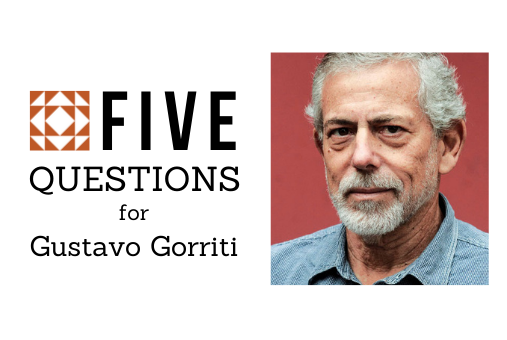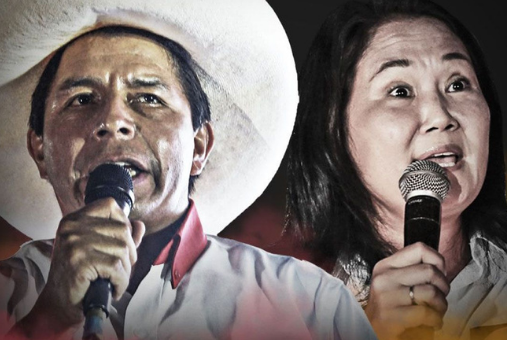If political reality in Peru were known only through the lens of the country's traditional press, public opinion would be influenced by the "crushing weight" of that press, which is in the almost absolute power of a single media group, explained the investigative journalist Peruvian Gustavo Gorriti Ellenbogen in an interview with LatAm Journalism Review (LJR).

(Photo credit: Revista Caretas)
In his opinion, since the rural school teacher Pedro Castillo — invited to run for the Peruvian presidency by a left-wing party — began to emerge as a possible presidential contender towards the run-off of 2021, against his opponent Keiko Fujimori, right-wing candidate and daughter of former president Alberto Fujimori, "the concentrated press" tried to "undermine" his candidacy, and now, his government.
Gorriti, a Nieman Fellow in 1986, has won prestigious journalistic awards such as the Maria Moors Cabot Award in 1992 from Columbia University, the King of Spain Award in 1996, and the Freedom of Expression Award from the Committee to Protect Journalists (CPJ, by its English acronym), in 1998. He also won the CEMEX-FNPI New Journalism Award, in 2010.
When he gave his speech for this latter award, Gorriti described journalists as "historians of the present," those who write the history of Latin America.
Considered a master by many journalists, not only in Peru but elsewhere, the veteran reporter has managed to uncover facts through his investigations that have shaken up both foundations and governments.
In the following five-question interview, Gorriti analyzes the relationship between current Peruvian President Pedro Castillo and the traditional or “concentrated” press, and the independent press, from Castillo’s turbulent run as a presidential candidate to his shaky first months in office.
1. In your opinion, how would you summarize the way in which the media presented (or represented) Peruvian President Pedro Castillo as a candidate during the 2021 electoral campaign?
First, we need to understand what we mean by “media” or “press” in present-day Peru. In terms of the traditional print press, El Comercio, a single family-based business group, has an inordinate position of dominance in that area [media concentration], in terms of joint circulation, distribution, and readership. That same group maintains control of two-thirds of the shareholding of the main broadcast TV station (América TV) and its cable news subsidiary (canal N).
There are other newspapers and media outlets that set their own line (such as Grupo La República), but their scope and reach is much smaller. The GLR is a partner of El Comercio on América TV/canal N, but since it barely owns a third of the shares, it has no influence or decision-making capacity over the editorial line.
A few years ago, a group of prominent Peruvian journalists filed a lawsuit to break the virtual monopoly dominance of Grupo El Comercio. The lawsuit has run through the meanders of the Peruvian judicial system with a telling slowness close to catatonia.
However, there are independent media outlets and robust investigative journalism, but mainly in the digital environment. I believe they offer a counterpart of excellence and depth –although I must admit my bias by being the director of one of them–. But people’s daily, everyday opinion of is strongly influenced, in one way or another, by the crushing weight of the concentrated press; or, if you prefer, cartelized press.
Having made this long but necessary introduction, I’ll answer. First, the elections, held in the midst of a pandemic with devastating effects across the board, were out of the ordinary from the start. In the first ballot (or round), Castillo grew through a campaign carried out below the radar of big media.

Pedro Castillo and Keiko Fujimori during the Presidential election campaign in 2021. (Courtesy)
In the second round, between Pedro Castillo and Keiko Fujimori, the concentrated press launched into opposition and tried to undermine Castillo's candidacy. They were not the only ones, from the center right to the growing far right and their openly fascist groups, they went all out in a campaign to prevent Castillo's victory and seek Fujimori's victory.
It must have been easy because Castillo was a lousy candidate who did not know how to hide his shortcomings. A chance candidate (he was not and is not a militant) of the Free Peru party, which calls itself leftist but is linked to the authoritarian kleptocracies of Venezuela and Nicaragua, Castillo campaigned with empty slogans. But the aversion to Fujimori-ism and the extreme right granted him a narrow victory.
During that second round and afterwards, the concentrated press produced propaganda journalism that, at times, would have embarrassed the old editorial offices of Pravda or Izvestia.
We had as candidates the bad and the worst. That press only had eyes and screams printed for one of the candidates.
2. What do you think has changed, in that sense, since Castillo took office?
In the scarce seven months that Castillo has been president, there have been changes of scenery but not of intention. Regarding the first, the fear scenario vanished. The alarms, hysterical at times about masses of country folk confiscating and occupying the beach houses of the most privileged after looting their bank accounts, have ended.
This gave way to the reality of an indecisive, incompetent and erratic president, surrounded by circles of incompetent but frequently corrupt upstarts (not on the corrupt scale of sharks but of piranhas). There was a fight between factions and it was counterbalanced by a non-majority but decisive percentage of technocrats who have allowed the drunken ship of the Peruvian State not to crash on the reefs but to even show some signs of macroeconomic success.
The concentrated press has put all the spotlight on the Castillo government to stridently bring to light every scandal, minor scandal, blunder by Castillo or his entourage. And the extreme right? It does not exist for that press.
It must be said that Castillo and his people have made it easy work for those propaganda-leaning investigations. Currently, the virtually open campaign of the concentrated press is to remove Castillo through a destitution process from Congress.
3. How would you define the relationship of President Castillo and the ruling party with the press?
First, there is no official party. Castillo came to the presidency through Peru Libre, the party led by Vladimir Cerrón, who was unable to run due to important corruption charges against him. Castillo's relationship with Peru Libre is rocky. He had the support of a more moderate left, some independents and teachers' unions. Now, he hands out ministries among various groups to ensure that the opposition does not have enough votes to oust him.
Castillo's response to attacks from the concentrated press is erratic. Some ministers have begun to speak of a "coup press," and there have been one or two mumbled threats about the use of state advertising. In general terms, I’d say that the concentrated press is overwhelming Castillo with its daily avalanche of headlines. When some of his 'advisors' (the three stooges would have been more effective) suggested he face the 'press,' an interview was arranged for Castillo with Fernando del Rincón, from CNN. The result fluctuated between embarrassing and disastrous.
4. What relationship does the traditional press and the independent press have with the opposition? How would you analyze the threat of the current president of Congress to the media that did not give favorable coverage to her recent exchange of words with the mayor of Arequipa in Parliament?
The extreme right, which has a growing weight in national politics and influence in Congress, is not even mentioned as a threat to the democratic system by the concentrated press. The president of Congress is a woman with a sour character and limited intelligence who, although she comes from a democratic party, acts in fact as an ally of that extreme right. Her threat would mean a lot if the extreme right comes to power. For now, it has not come to pass.
5. Is freedom of the press in Peru currently precarious? Can the current situation be compared with the conditions that existed for freedom of expression and the press during the Fujimori decade?
They are not alike at all. Fujimori was a dictator who, through Montesinos and his spies, achieved total control over Congress, the Judiciary, the Attorney General's Office, and the security forces. In addition, he co-opted the business community and controlled the mass media (with very honorable exceptions) by buying their owners.
Castillo's is a government that stumbles over its own feet, that does not have a majority in Congress and that daily faces a concentrated press whose goal, through propaganda campaigns, is to undermine his government and achieve his removal.
It is not a difficult mission, since it often seems that Castillo himself tries, by accumulating errors and stupidities, to collaborate with them.
Does that represent any danger? If a boxer, no matter how bad, goes into a boxing match with a sandbag, does he have a chance of getting hit?
It is a sad chapter for Peru, one of danger to its democracy, of setbacks as a nation, of dishonor for the concentrated press and a great challenge for independent journalism.